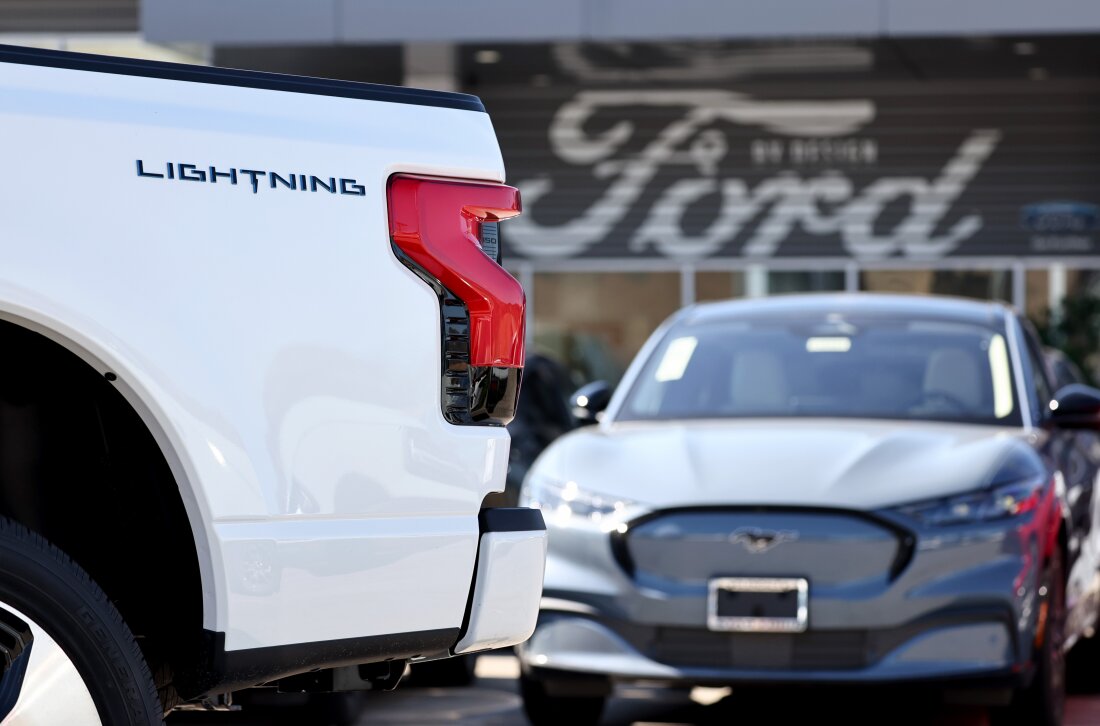

The Ford F-150 Lightning electric pickup truck goes on sale at a Ford dealership in Glendale, Calif., on Aug. 21. Ford says it is reversing its North American electric vehicle strategy to focus on hybrids, citing consumer demand for affordability and longer range.
Mario Tama/Getty Images
Hide caption
toggle caption
Mario Tama/Getty Images
If you’re a potential family car buyer who’s hesitant to buy an electric car because of high prices and concerns about long commutes, Ford is thinking about you. In fact, the automaker is hedging its EV plans, betting that most consumers will prefer a hybrid to a fully electric vehicle.
“When you look at three-row SUVs, hybrids or multi-drive technologies, for those customers, are the best solution,” John Lawler, Ford’s vice president and chief financial officer, said Wednesday in a conference call with reporters.

Ford, the second-largest electric carmaker in the United States, was working on an all-electric three-row SUV. It discontinued that vehicle earlier this year, and now, Lawler and Ford say, it’s done. Instead, Ford will offer hybrid versions of its SUVs. The next electric vehicles in its lineup are now pickup trucks and commercial vehicles — areas where Lawler sees a competitive advantage.
Ford says all of its new vehicles must be profitable within 12 months
The strategic shift reflects Ford’s new requirement that any vehicle be profitable within 12 months of launch — a significant hurdle for a fully electric three-row SUV. Add to that a cooling EV market on the consumer side even as companies ramp up their offerings and competitive pressures, and Ford leadership saw fit to change course.
“We’re seeing a tremendous amount of competition” in the SUV segment, Lawler said. “In fact, S&P Global said … there are about 143 electric vehicles currently in production for North America — most of them two- and three-row SUVs.”
The change comes as Ford tries to turn the numbers around on electric vehicles. As NPR reported earlier this year, the company was losing money on every electric vehicle it sold. It has had to cut sales forecasts in preparation for more changes, including an expected wave of new Chinese competitors. The company says it’s still working on a smaller car, for example. And it’s moving battery production to North America to allow it to take advantage of production and consumer incentives.

Increasing production of the electric SUV comes at a cost: Ford says it will take a “special non-cash charge of approximately $400 million for impairment” related to manufacturing assets, with additional expenses rising to $1.5 billion.
Ford will continue to sell its current all-electric vehicles — the Mustang Mach-E and F-150 Lightning pickup truck — along with commercial trucks. The company has not yet announced whether it will offer a plug-in hybrid SUV. But the shift from electric cars to hybrid SUVs could ease pressure on its bottom line.
It’s all about the battery size.
“In electric vehicles, it’s all about the battery,” Stephanie Valdez Streety, director of industry insights at Cox Automotive, told NPR. Depending on the variants, batteries can make up as much as 40% to 45% of the cost of a vehicle, she added.
This is especially true for large SUVs with long ranges. For automakers, the shift from all-electric to hybrid vehicles provides more room to maneuver.
“When you can shrink the battery size, whether it’s an electric vehicle or some kind of extended-range vehicle — in these larger vehicles, like a three-row SUV, the profit profile is better,” Lawler said. “Because the cost of the battery is so high for vehicles like this.”

The equation will change a bit as battery technology advances, says Streety. But she also says consumers may simply need to evaluate how much range they really need — and get used to the idea that a bigger battery means a higher price.
“That’s why I think plug-in hybrids are a good option for consumers who want to switch to electric vehicles, but really need that option.” [also use] “Gas if they need to go on a long trip,” she said.
Regarding the changes announced by Ford, Streety said the automaker is not alone in adjusting its plans, noting that General Motors and Tesla have also seen production cuts.
“Consumer demand is still there,” Streety said. “We had a record quarter last year for electric vehicles in the US, but the pace of growth has slowed.”
“I think the important thing is that it should be expected. Switching to battery electricity is hard, isn’t it?”
Streety said automakers like Ford have to keep a moving target on their plate as they try to meet consumer demand, ranging from manufacturing and charging infrastructure to consumers adapting to a different car ownership experience.
“We will have ups and downs,” she said.

“Web maven. Infuriatingly humble beer geek. Bacon fanatic. Typical creator. Music expert.”





More Stories
Dow Jones Futures: Microsoft, MetaEngs Outperform; Robinhood Dives, Cryptocurrency Plays Slip
Strategist explains why investors should buy Mag 7 ‘now’
Everyone gave Reddit an upvote